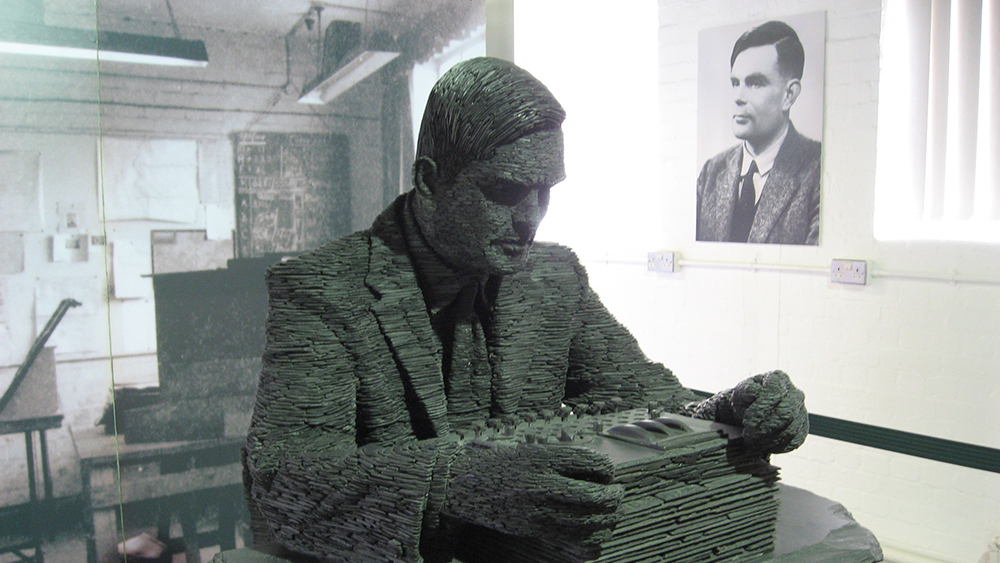Why Alan Turing is a queer icon
Eighty years after the Bombe began code-breaking, its inventor is as relevant as ever


I often catch myself wondering where Turing would be if he was alive in our times: Would he get married to the man of his dreams? Would he enjoy drag shows? What would his opinion be on the lack of representation in the tech industry? What pronouns would he prefer to use? After all, we might be wrong by assuming that he would choose he/him/his. What other life changing inventions would he have come up with, if he was allowed to continue his work for the government? Or would he prefer to work for a non-profit, launch his own start-up, or work for an American tech giant like Apple or Google?
On the outside, Turing and I are completely different individuals. At school, he excelled at scientific and mathematical subjects, while I preferred classics (which is a nice way of saying that I barely passed maths). His work is considered so important that it is credited with shortening the Second World War by two whole years, saving around 14 million lives. Meanwhile, I’m just a simple journalist who happens to write about tech.
However, we also share some similarities. We are both Londoners who disagree with Wittgenstein: Turing argued with him personally at Cambridge in 1939, while I failed to find any common sense in his arguments as an undergraduate philosophy student. We both attempted to lead a heteronormative life which did not quite work out. The crucial difference between our experience being that his identity was considered illegal, while I, born almost half a century after his death, am fortunate to live in more open-minded times.
As a member of the LGBTQ+ community, Alan Turing – who would have celebrated his 108th birthday today – was, and is, one of us. He is the embodiment of talent which was forever lost because of the adverse reaction to his identity. I may not have a mandate to speak on behalf of the entire community, but I strongly believe that anyone can see a part of Alan Turing in themselves, and a part of themselves in Turing. Anyone, who had ever been discriminated against for their sexual orientation or gender identity.
As I write this, the US Supreme Court has only just ruled that employers who fire workers for being gay or transgender are breaking the 1964 Civil Rights Act. Even on the morning of 15 June 2020, members of the LGBTQ+ community in 26 (out of 50) states were forced to wake up and commute to their job which could, at any moment, dismiss them because of their identity. Alan Turing was one of the people who was forced to experience this treatment.
Being LGBTQ+ means that you have a one in two chance of suffering from depression. It means that there is at least a one in eight chance that you had attempted suicide in only the last year. It means celebrating Pride one day and finding out that healthcare professionals can legally choose to not treat you the next. It means watching the news and hearing from the president of an EU-member country that, apparently, you are not a person, but “an ideology worse than communism”.
However, it also means being able to claim Alan Turing, the inventor of the Bombe and saviour of around 14 million people, as one of your own. A person who is so queer that he was conveniently born right in the middle of Pride Month, 57 years before the Stonewall riots that kicked off the Pride movement actually happened. A person who believed in fortune-telling just as much as many believe in astrology. A person who was played in a movie by Benedict Cumberbatch, one of Britain’s most beloved modern actors. A person who hopefully wouldn’t mind me listing all the gay stereotypes that make him so iconic and likeable.
Sign up today and you will receive a free copy of our Future Focus 2025 report - the leading guidance on AI, cybersecurity and other IT challenges as per 700+ senior executives
I would like to wish a Happy Pride Month to everyone, but especially Alan Turing: a tech-inventing, Wittgenstein-opposing, queer, gay icon.
Having only graduated from City University in 2019, Sabina has already demonstrated her abilities as a keen writer and effective journalist. Currently a content writer for Drapers, Sabina spent a number of years writing for ITPro, specialising in networking and telecommunications, as well as charting the efforts of technology companies to improve their inclusion and diversity strategies, a topic close to her heart.
Sabina has also held a number of editorial roles at Harper's Bazaar, Cube Collective, and HighClouds.
-
 ControlUp snaps up Unipath to broaden AI capabilities
ControlUp snaps up Unipath to broaden AI capabilitiesNews The digital employee experience (DEX) provider is implementing a new agentic AI framework to eliminate IT involvement in building remediations
-
 EU businesses will flock to ‘region-specific’ AI platforms by 2027 – but cost could be a major hurdle
EU businesses will flock to ‘region-specific’ AI platforms by 2027 – but cost could be a major hurdleNews The pressure for sovereign AI is increasing, but achieving it will be expensive
